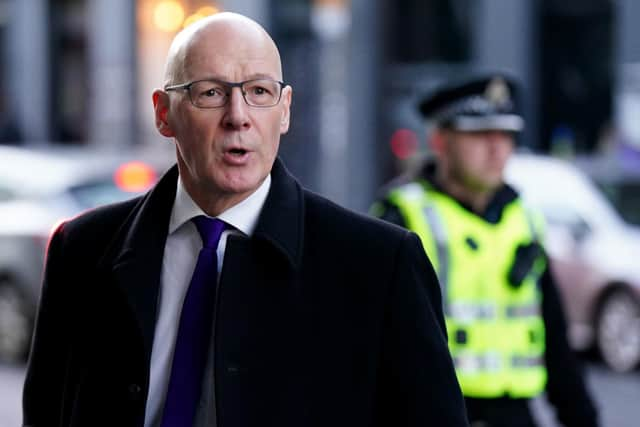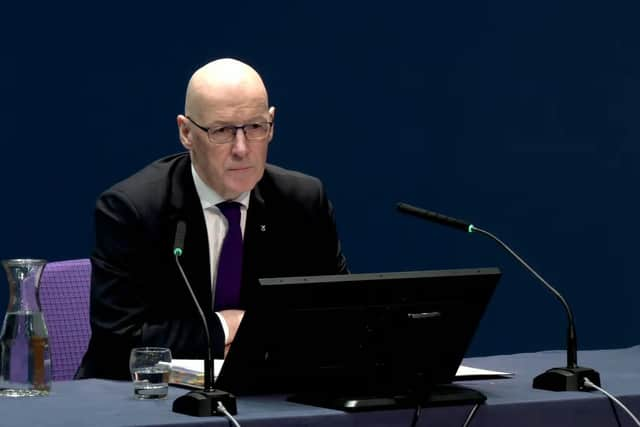UK Covid Inquiry: John Swinney’s safe pair of hands fail to batten the hatches amid pandemic scrutiny
As someone who occupied the heart of devolved government for nearly 16 years, John Swinney has enjoyed many accolades. He has been hailed by his peers in the SNP as a safe pair of hands, while even his harshest critics across the Holyrood divide have recognised his status as a dependable veteran.
But if his appearance before the UK Covid inquiry on Tuesday demonstrated anything, it is that his experience makes him an ill-suited candidate to defend the government he served from accusations that it was run by a narrow clique during the pandemic.
Advertisement
Hide AdAdvertisement
Hide AdA year has not yet passed since Mr Swinney stepped away from his ministerial duties, but his loyalty to the party remains unswerving. Over the course of nearly four hours, the 59-year-old sought to characterise an administration that was doing its best in extraordinarily testing circumstances. He spoke movingly as he recalled the death of his own mother at the outset of the pandemic, and he was sincere and empathetic as he recalled the fear, anxiety and uncertainty wrought by the virus. But on the substantive matter of how the Scottish Government made decisions during a once-in-a-lifetime pandemic, he struggled to offer a credible case.
Given the focus of the inquiry’s hearings in Scotland, it is unsurprising that a sizable chunk of Mr Swinney’s time in the hot seat was spent addressing how – and who – made the calls that no politician ever wants to make. He was never evasive in his answers, but neither was he the embodiment of candour.
At times, Mr Swinney seemed to treat the questions as an exercise in semantic tip-toeing. This included when inquiry lawyer, Jamie Dawson KC, pointed out that although Mr Swinney was a member of several WhatsApp group chats identified by the inquiry, he had said in his written statement he was not party to any such groups with ministers and civil servants that “considered ongoing issues in relation to the pandemic”.
Pressed on this apparent contradiction, Mr Swinney tried to square the circle, exhibiting a veteran politician’s masterful gift of promising clarity, and delivering the precise opposite. He insisted he didn’t consider the groups in question to be “passing that test”. Instead, he regarded them as “technical information feeds” containing relevant answers to certain points, adding: “They weren’t ongoing discussions.”
In one blustery spiel that would have reduced Sir Humphrey Appleby to blushes, Mr Swinney moved to summarise his position as only Scotland's longest serving elected parliamentarian could, saying: “I would say that my view in all of that was that the steps I was taking in relation to the way in which I was handling information was consistent with that approach, of ensuring that whatever information I had was available for and placed on the official record of the government to make sure that was available for the inquiry”


Did that clear things up? Not as far as the inquiry chair was concerned, with Baroness Heather Hallett taking a scythe to the chaff. “Once you realised there was going to be a statutory inquiry, did you not think to question the policy of deletion?” she asked. “Did you not ask somebody ‘this is what we do in normal times, but what do we do now?’”
Mr Swinney replied: “I didn’t ask that question. I took the view that the approach I had been advised to take all throughout my ministerial career was the appropriate one, because nobody had ever said to me to the contrary. And I believed I was furnishing the record with any relevant information that would be necessary for the inquiry.”
It appeared for a moment Mr Swinney had finished speaking, but he drew breath and provided a surprising addendum. “If I have misunderstood the policy of the Scottish Government in this respect, then I would apologise unreservedly for so doing, because my intention was never to do anything other than to make sure the official record was furnished with all the information that it needed to have,” he said.
Advertisement
Hide AdAdvertisement
Hide AdMr Dawson asked Mr Swinney if it was possible the “defect” may lie with the government’s policy around information retention, rather than his implementation of it. “That might well be the case, Mr Dawson,” Mr Swinney responded.


The significance of those exchanges should not be underestimated. They further undermine the credibility of the government’s information retention policy and invite scrutiny of how senior Cabinet members could cleave to such wildly inconsistent interpretations. Worse still, the acceptance by Mr Swinney there may be legitimate doubts as to the robustness of that policy begs the question of why it has taken him until now to voice such concerns.
Mr Swinney also floundered when trying to play down the significance of the government’s Gold Command group. He rejected the idea that he, Nicola Sturgeon and a small group of others made decisions about the pandemic. Any decisions taken outside of Cabinet, he stressed, were of “marginal detail”.
Unfortunately, for him at least, the inquiry was shown documents which indicated the opposite. Minutes from a crunch Cabinet meeting in December 2020 noted how those in attendance “agreed to delegate” to Ms Sturgeon “the responsibility for finalising proposals in response to the threat posed by the new variant of the virus”. The minutes added that responsibility was also delegated to Ms Sturgeon and Mr Swinney for “any further further decisions that might be required to take into account”.
Referencing those minutes, and the broad delegations of powers outlined in them, Mr Dawson asked a pointed question: “This is in effect a delegation of all decision making power at that stage, isn’t it?” The answer was not especially persuasive. Despite taking his leave from its ranks, Mr Swinney is one of the government’s staunchest defenders. Yet if the evidence of Tuesday is any guide, not even his safe pair of hands could batten down the hatches.
Comments
Want to join the conversation? Please or to comment on this article.